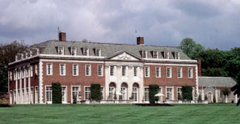Winfield House
| Winfield House | |
|---|---|

Winfield House 1936
|
|
| General information | |
| Architectural style | Neo-Georgian |
| Location |
Regent's Park London, England, United Kingdom |
| Coordinates | 51°31′51″N 0°09′52″W / 51.5308°N 0.1644°WCoordinates: 51°31′51″N 0°09′52″W / 51.5308°N 0.1644°W |
| Current tenants | United States Ambassador to the United Kingdom (since 1955) |
| Construction started | 20th century |
| Completed | 20th century |
| Owner | United States government |
| Design and construction | |
| Architect | Leonard Rome Guthrie |
| Architecture firm | Wimperis, Simpson and Guthrie |
Winfield House is a mansion set in 12 acres (4.9 ha) of grounds in Regent's Park, the second largest private garden in central London, after that of Buckingham Palace. Since 1955, it has been the official residence of the United States Ambassador to the Court of St. James's. It is Grade II listed as an "exceptional ambassador's residence and as a notable Neo-Georgian town house containing numerous features of note."
The first house on the site was Hertford Villa, the largest of the eight originally built in the park as part of John Nash's development scheme. The actual house was designed by Decimus Burton for the notorious Regency rake, Francis Seymour-Conway, 3rd Marquess of Hertford, who used it for orgies. Later the Georgian villa was known as St Dunstan's, because of the distinctive clock that hung in front of it, purchased by the art collecting Marquess when material from St Dunstan-in-the-West was auctioned off in 1829–30 prior to the church's demolition.
Later occupants included newspaper proprietor Lord Rothermere and the American financier Otto Hermann Kahn. Kahn lent it during World War I to a new charity for blinded servicemen, which took the name of St Dunstan's.
The villa was damaged by fire in 1936 and was subsequently purchased by the American heiress Barbara Hutton, who demolished it.
...
Wikipedia
